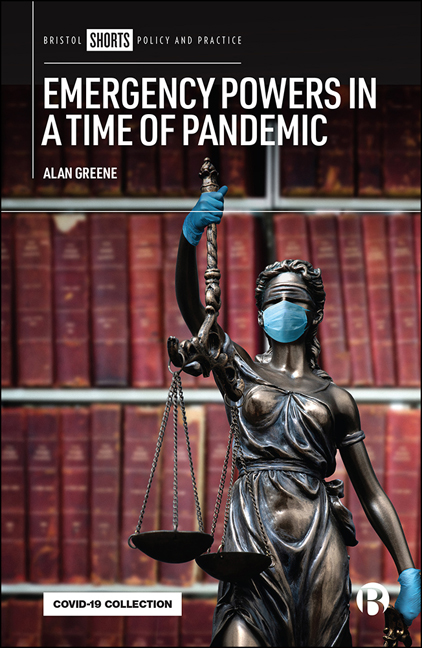Book contents
- Frontmatter
- Contents
- Notes on the Author
- Acknowledgements
- Introduction
- One The Pandemic State of Emergency
- Two Pandemics and Human Rights: Non-Derogable Rights
- Three Pandemics and Human Rights: Derogable Rights
- Four Pandemics and Democracy
- Five The End of the Pandemic Emergency
- Six Conclusions: Breathing Space
- Index
Four - Pandemics and Democracy
Published online by Cambridge University Press: 12 March 2021
- Frontmatter
- Contents
- Notes on the Author
- Acknowledgements
- Introduction
- One The Pandemic State of Emergency
- Two Pandemics and Human Rights: Non-Derogable Rights
- Three Pandemics and Human Rights: Derogable Rights
- Four Pandemics and Democracy
- Five The End of the Pandemic Emergency
- Six Conclusions: Breathing Space
- Index
Summary
Introduction
Chapter Two (Pandemics and Human Rights: Non-Derogable Rights) and Chapter Three (Pandemics and Human Rights: Derogable Rights) focused on the impact that pandemics can have on human rights. I argued that declaring a state of emergency would be the best way to ensure that these exceptional powers remain temporary and that their deployment would not lead the way to their future application outside a pandemic situation.
Yet the judiciary alone cannot – and should not – be the sole defender of human rights; the legislature and the executive must also take rights seriously. Furthermore, the impact of emergencies are not limited solely to human rights. To recall from Chapter One (The Pandemic State of Emergency), a key reason why the Roman Republic appointed a dictator in an emergency was because of the cumbersome constitutional checks and balances that the Republic had in place to prevent absolute power from being consolidated in a single institution.
As emergencies require swift responses, today this invariably means that the executive takes charge, with the judiciary and the legislature taking a back seat. Consequently, emergencies impact on the separation of powers, affecting how these other branches can fulfil their constitutional functions. While this is the case for all emergencies, as we shall see, pandemics raise their own unique challenges – in particular for legislatures. That stated, the case for executive supremacy during a pandemic is also considerably weaker.
The importance of legislatures
On 28 August 2019, UK Prime Minister Boris Johnson cast the die. Long before anybody had ever heard of COVID-19, Parliament was to close. It was to be ‘prorogued on a day no earlier than Monday the 9th day of September and no later than Thursday the 12th day of September 2019 to Monday the 14th day of October 2019’. This five-week prorogation was considerably longer than the usual couple of days, with many crying foul and arguing that the real motivation was not the stated reason of ‘preparing a new Queen's Speech’, but instead to frustrate Parliament's capacity to pass legislation that may prevent the UK from leaving the EU without a deal on 31 October 2019. The move sparked outrage and the almost immediate launch of court proceedings to have the prorogation declared unlawful.
- Type
- Chapter
- Information
- Emergency Powers in a Time of Pandemic , pp. 93 - 118Publisher: Bristol University PressPrint publication year: 2020



